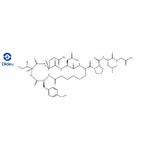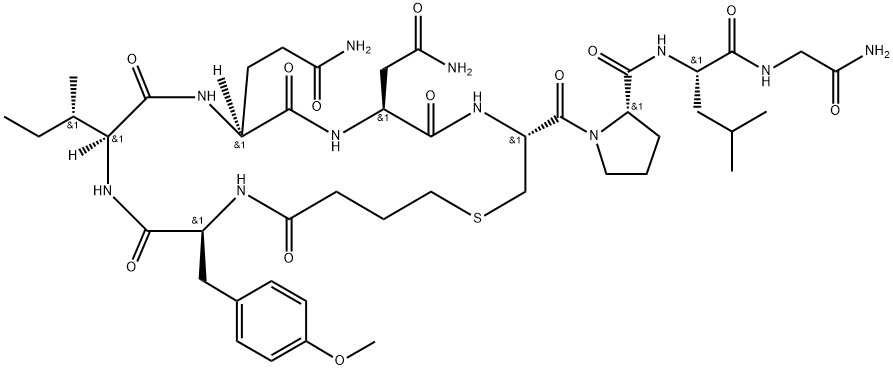Carbetocin: Pharmacology and Adverse Effects
General Description
Carbetocin is a synthetic analogue of oxytocin, designed to enhance stability and pharmacological efficacy. It exhibits significant agonistic properties at oxytocin receptors, leading to rhythmic uterine contractions, making it valuable in obstetric care. With a longer half-life than oxytocin, carbetocin induces effective uterine contractions through both intravenous and intramuscular routes. While it shares similar side effects with oxytocin, such as hypotension and nausea, carbetocin shows a better profile, notably lower rates of nausea and vomiting compared to Syntometrine. Contraindications include its use in labor and in patients with cardiovascular issues, although recent studies indicate it may have a favorable safety profile.

Figure 1. Carbetocin
Pharmacology
Structure and Mechanism of Action
Carbetocin is a synthetic octapeptide analogue of oxytocin, developed initially in the 1970s for veterinary use. Unlike the nonapeptide oxytocin, carbetocin features several structural modifications that enhance its stability and pharmacological profile. Specifically, carbetocin replaces the amino group of cysteine with a hydrogen atom, alters the disulfide bond to a thio-ether bond, and substitutes the hydroxyl group of tyrosine with a methyloxyl group. These alterations confer a greater resistance to enzymatic degradation by disulfidase, aminopeptidase, and oxidoreductase. Consequently, carbetocin exhibits pronounced agonistic properties at oxytocin receptors, particularly in the smooth muscle of the uterus. This receptor binding results in rhythmic uterine contractions, heightened frequency of existing contractions, and increased uterine tone, marking carbetocin as a vital pharmaceutical agent in managing uterine-related conditions. 1
Pharmacodynamics and Pharmacokinetics
The pharmacodynamic properties of carbetocin are notably similar to those of endogenous oxytocin, enabling significant therapeutic applications. Pharmacokinetic studies have revealed that the half-life of carbetocin, particularly when administered intravenously, is approximately 42 minutes, which is significantly longer—up to ten times—than that of oxytocin. The effects of carbetocin administered intravenously at dosages of 8 to 30 micrograms result in a rapid tetanic uterine contraction lasting about six minutes, followed by rhythmic contractions that persist for an extended duration of roughly 60 minutes. In contrast, an intramuscular administration of carbetocin, at dosages between 10 to 70 micrograms, similarly induces tetanic contractions lasting approximately 11 minutes, with rhythmic contractions extending for about 119 minutes. These variations in contraction duration can be attributed to the differences in absorption rates, in addition to the more lipophilic nature of carbetocin compared to oxytocin. 1
Broader Effects and Clinical Implications
Beyond its primary role in stimulating uterine contractions, carbetocin has garnered interest for its potential neuroendocrine and analgesic effects, akin to those exhibited by oxytocin. In preclinical studies, carbetocin has demonstrated abilities similar to fluoxetine in enhancing social interaction and alleviating learned helplessness in animal models such as tree-shrews. However, it is important to note that carbetocin does not fully replicate the receptor affinities of endogenous oxytocin within the brain, as it displays selective affinity for specific subtypes of oxytocin and vasopressin receptors. Clinical findings have indicated that a single dose of carbetocin at 100 micrograms significantly reduces pain intensity following caesarean delivery compared to traditional oxytocin treatments. Additional analyses of randomized controlled trials suggested that while differences in opioid consumption in the first 72 hours post-delivery among carbetocin, oxytocin, and placebo groups were not statistically significant, carbetocin holds promise for improving analgesic outcomes in obstetric care. This multifaceted pharmacology underscores carbetocin's potential for broader therapeutic applications beyond uterine contraction stimulation. 1
Adverse Effects
Common Adverse Effects
Carbetocin shares a structural relationship with oxytocin, resulting in a side effect profile that includes hypotension, nausea, flushing, and abdominal pain. In a comprehensive Cochrane review assessing the use of carbetocin for the prevention of post-partum hemorrhage, pooled data indicated no statistically significant differences in adverse effects when compared to oxytocin. Specifically, women who received carbetocin experienced similar risks of headache, abdominal pain, nausea, vomiting, and premature ventricular contractions as those administered oxytocin. Notably, the side effect profile of carbetocin is advantageous compared to Syntometrine, as studies showed that women treated with carbetocin were significantly less likely to experience nausea and vomiting, as well as post-delivery hypertension. 2
Cardiovascular Effects and Contraindications
In terms of cardiovascular effects, a study comparing heart rate and blood pressure changes during elective caesarean delivery using carbetocin and oxytocin demonstrated indistinguishable hemodynamic effects between the two drugs. Increases in heart rate were recorded for both treatments; however, women treated with carbetocin exhibited a more gradual recovery to baseline values without significant symptoms, unlike those treated with oxytocin, who showed a slight rebound bradycardia. While a case report noted an incidence of acute coronary syndrome linked to carbetocin administration, this case did not reveal significant abnormalities upon further investigation. Contraindications for carbetocin include its use during labor, induction of labor, and in patients with preeclampsia, cardiovascular disorders, or epilepsy. Nevertheless, a randomized controlled trial involving patients with severe preeclampsia suggested that carbetocin did not result in major adverse hemodynamic effects, which may contribute to broader clinical considerations regarding its safety profile. 2
References:
[1] D.N. ONWOCHEI D T M. The role of carbetocin in the prevention and management of postpartum haemorrhage[J]. International journal of obstetric anesthesia, 2017, 32: 1-96. DOI:10.1016/j.ijoa.2017.06.001.[2] LIN-LIN SU M S Yap Seng Chong. Carbetocin for preventing postpartum haemorrhage.[J]. ACS Biomaterials Science & Engineering, 2012. DOI:10.1002/14651858.CD005457.pub3.
You may like
See also
Lastest Price from Carbetocin manufacturers

US $0.00-0.00/KG2025-11-21
- CAS:
- 37025-55-1
- Min. Order:
- 1KG
- Purity:
- 98
- Supply Ability:
- 10000KGS

US $1.00/g2025-09-22
- CAS:
- 37025-55-1
- Min. Order:
- 10g
- Purity:
- 99
- Supply Ability:
- 999


